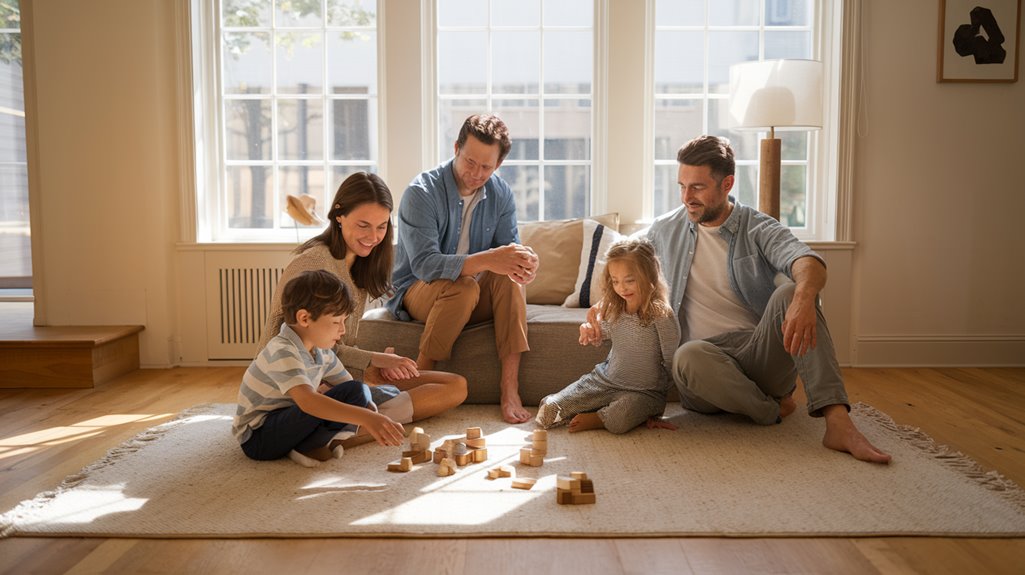Living in a big house might sound wonderful, but it may not make your family happy. When you have a big home, you need to spend more money on things like power bills and repairs. You'll also spend lots of time cleaning rooms that no one uses instead of playing with your kids. In a big house, family members often end up far apart from each other. This means fewer chances to talk and share fun times together. A big home also costs more to heat in winter and cool in summer. Before you move to a bigger house, think about what will really make your family happy.
Ready to start building equity in your own Michigan home? Get your personalized home loan quote today.
Higher Monthly Utility Costs
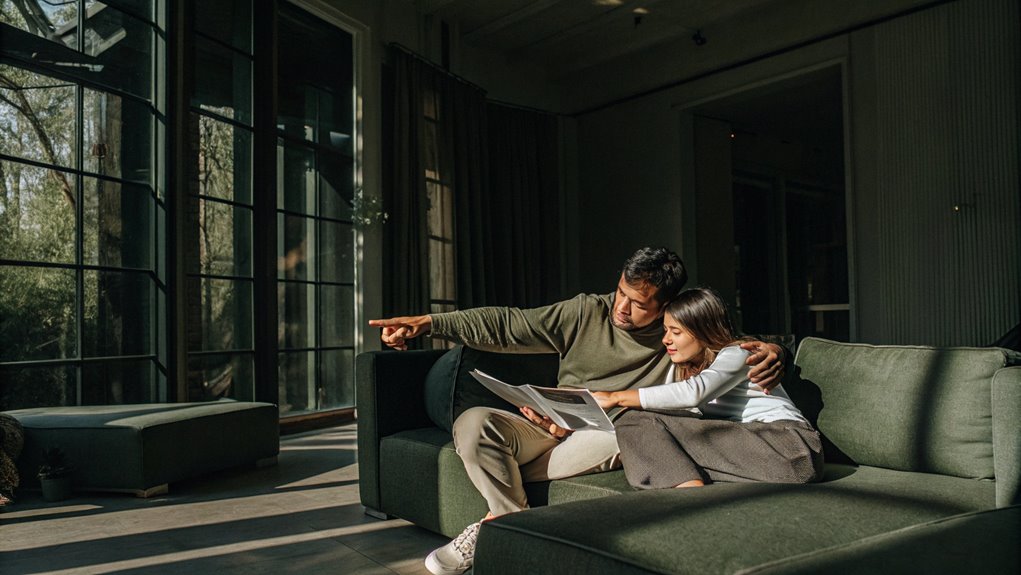
When you move to a bigger home, you'll pay more for power and water each month.
More space means using more heat in winter and more cooling in summer. Each room needs power to stay at the right temp.
Your water bill will go up too. Big yards need lots of water. More bathrooms mean more water use.
You also need more lights to see in all the new rooms, which means a higher power bill. Even small things cost more – like new air filters and soap to clean the extra space.
Look at your money first. Think about if you can pay these bigger bills each month.
Many people get shocked when they see how much it costs to run a bigger home.
Michigan residents, unlock the door to your new home. Request your home loan quote from Treeside Financial today.
More Time Spent Cleaning
Having a bigger home means spending more time cleaning it. Think about all the extra space you need to take care of now. You'll need to sweep and mop more floors. You'll have to wipe more dust off tables and shelves.
And those extra bathrooms won't clean themselves! What once took you two hours might now take up half your day. Instead of playing with your kids on weekends, you might find yourself busy with a mop and duster.
All those extra rooms need your care to stay neat and tidy. Even with help from a cleaning service, you still need to pick up toys, clean kitchen counters, and keep things in order every day.
This extra work can make life harder for you and your family. It can make you feel tired and stressed when you just want to relax at home.
Increased Property Taxes
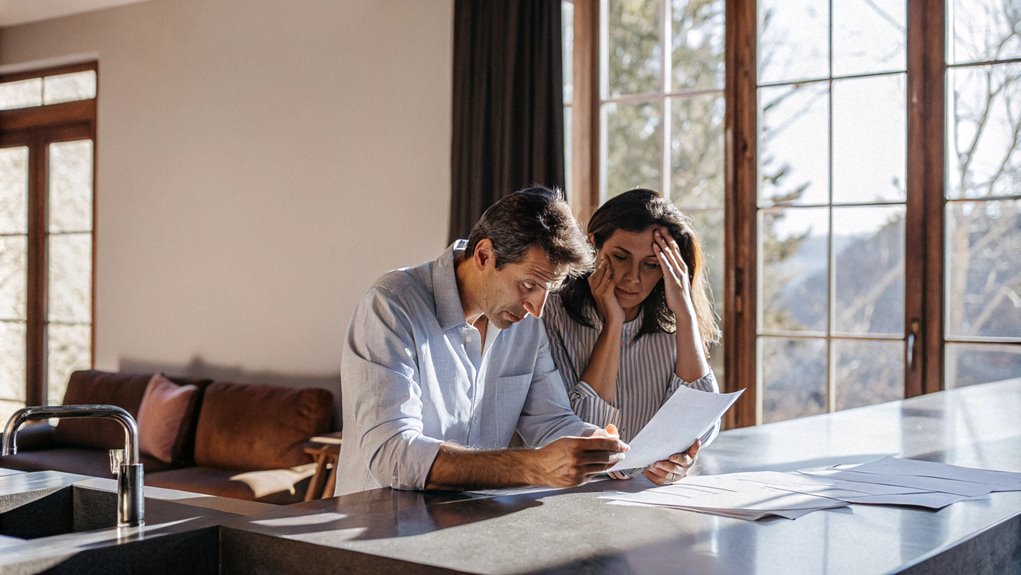
When you buy a bigger house, you pay more in taxes every year. Think of property taxes like a yearly bill that goes up when your house is worth more. Just like a bigger pizza costs more, a bigger house means bigger tax payments.
Over time, these taxes often go up, even if your house stays the same. If you plan to live in your big house when you retire, you need to think about paying these taxes. Many of our friends and neighbors forget about this part.
Before you move to a bigger house, add up all the costs. Property taxes aren't a one-time cost. You'll pay them every year you live there.
You might be closer to buying your home than you think
Take our 2-minute home buyer readiness quiz to see how prepared you really are – no credit check required.

Make sure you can afford these payments now and in the future.
Family Connection Suffers
When families live in big houses, it can be harder to stay close. Mom might be upstairs while Dad is in the basement. The kids often go to their own rooms instead of being together.
We miss out on the little chats that happen when we bump into each other. In a small house, we see each other more. We talk more. We share more laughs.
Big houses make it easy to eat alone. Each person can watch TV in their own space. Soon, we stop eating dinner as a family. We stop telling stories about our day.
To stay close in a big house, we've to try harder. We need to find ways to spend time together. A big house means more space, but it shouldn't mean less love.
Maintenance Challenges and Expenses
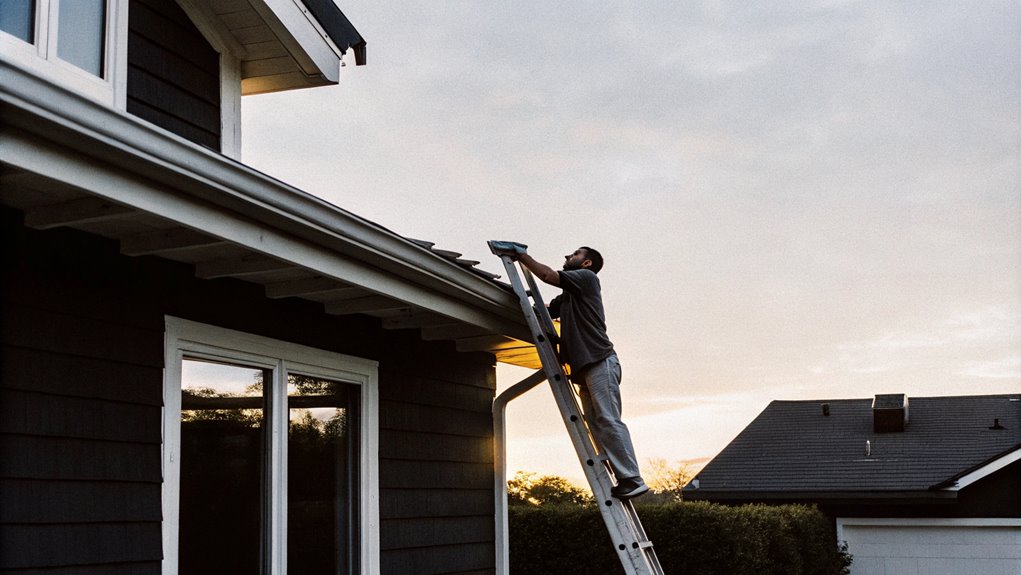
Living in a big house can hit your wallet hard. Just like you need to give more love to your family in a big home, you must watch your money closely too.
Big homes cost more to run. You pay more to keep rooms warm in winter and cool in summer. Empty rooms need furniture and pretty things to make them feel like home.
Every room needs cleaning and fixing when things break. The city also asks for more tax money when you own a big house. Insurance costs more too.
Sometimes you might need help from others to keep the house clean or take care of the yard. All these costs can make you worry about money. They can stop you from doing fun things with your family, like taking trips or trying new adventures.
Tips to remember:
- Heating and cooling costs more money
- New furniture costs add up fast
- Fixing things takes longer and costs more
- Taxes and insurance get bigger
- Paying others to help adds up each month
Environmental Impact
Living in a bigger house means you'll pay more money to keep your home warm in winter and cool in summer.
You'll also use more lights to brighten up all the rooms.
Building a big house needs lots of wood, cement, and metal.
When we use more of these things, it affects our planet.
What we do in our homes today shapes the world we share with others tomorrow.
Higher Energy Consumption
When you get a bigger home, you need more power to keep it running.
Think of all the rooms you need to keep warm in winter and cool in summer. Even rooms you don't use much still need power for lights and heat.
Your home will need:
- More power to heat and cool all the rooms
- More lights in more rooms
- More hot water for extra sinks and showers
- Power for rooms you may not use much
- More work to keep heat in during cold days
A bigger home means bigger power bills.
It also means your home uses more of Earth's resources.
Before you pick a big home, think about how much power it will need to run well.
Growing Carbon Footprint
Your dream home can be friendly to our Earth. When you build a big house, it takes more stuff to make it. This means more trees cut down and more factory smoke in our air.
Think about what happens when a house gets bigger. Workers need to clear more land. Trees and animals lose their homes.
Big houses need more power to stay warm in winter and cool in summer. All the new rooms need furniture and machines too. Each new thing we make affects our Earth.
But you can help! A smaller house can still fit your family well. It will use less power and be better for our planet.
More Building Materials Needed
When you build a big house, you need lots of stuff to make it.
Think of all the wood, concrete, and metal that goes into making your dream home! Your wallet will feel it, and so will Mother Nature.
Did you know:
- Each square foot needs about 15-18 pounds of wood
- Big houses need more concrete for the bottom part
- You need more fluffy stuff in the walls to keep warm
- Big windows and doors use up more glass
- Big roofs need more stuff to keep the rain out
These parts won't just cost you money when you build.
You'll keep paying to fix and replace them as your house gets older.
A bigger house means you'll always need more materials to keep it standing strong.
Empty Rooms Gather Dust
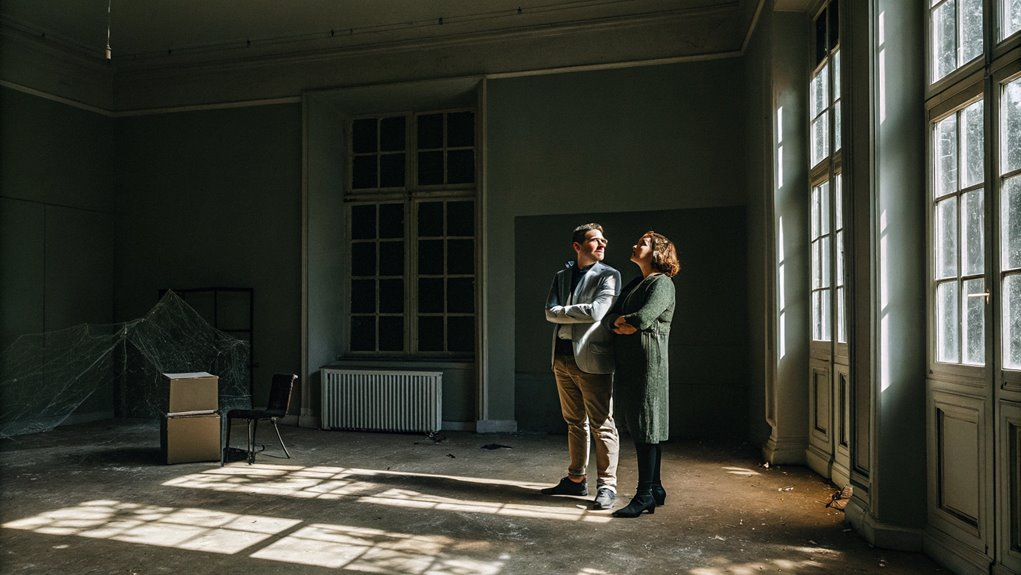
Having empty rooms in your home is like having a friend who never visits. You clean these rooms and pay to keep them warm or cool, but no one uses them.
It makes you feel sad to walk past these quiet spaces. You spend time and money taking care of rooms that don't make your family happy.
These empty rooms just sit there, gathering dust, while you work hard to keep them nice. Think of all the fun things you could do instead of cleaning rooms no one needs.
Wasted Time and Energy
A bigger home means more work for you.
Think about all those rooms you won't use much. You'll clean them over and over. You'll dust and vacuum floors that no one walks on. This takes time away from fun with your loved ones.
Empty rooms still need care:
- You pay to keep them warm in winter and cool in summer
- You buy more cleaning stuff
- You spend time cleaning instead of playing with family
- You need chairs and tables to fill the space
- More sinks and windows mean more scrubbing
Your time is special.
Ask yourself: Do I want to clean rooms I don't use? Or would I rather do things that make me happy with my family?
Unused Space Costs Money
Your empty rooms are costing you money right now. Think about it – you pay to keep these rooms warm in winter and cool in summer. You clean them and fix things that break. All this for rooms you don't even use!
Let's look at what one empty room costs each month:
- Heat and cool it: $30-50
- Property tax: $15-25
- Insurance: $10-20
- Fix-up costs: $20-40
This money could buy fun things for your family or go into your bank account. Many people find they're happier in smaller homes. They spend less money on empty space and more time with loved ones.
When you live in a home that fits your needs, you save money. Plus, your family stays closer because you share the space you use every day.
Maintenance Without Purpose
Empty rooms in your home can drain your time and energy. Dust builds up on tables and shelves. Spider webs grow in dark corners. You waste hours cleaning places no one even uses.
Think about all the work these rooms need:
- You pay money to keep them warm or cool
- You clean them on your weekends
- You fix up nice things that no one sees
- You could spend this time with your loved ones
- You worry about rooms that don't make you happy
Your home should make life better, not harder. Focus on the rooms where your family laughs, plays, and makes memories. Keep it simple. Keep what matters.
Storage Encourages Unnecessary Purchases
Extra space in your home can make you want to buy things you don't need. When you see empty shelves and closets, you might feel like you need to fill them up. This can lead to spending too much money on stuff you won't use.
| Where | Problem | How It Affects You |
|---|---|---|
| Closets | Too Many Clothes | Costs Too Much |
| Garage | Tools We Never Use | Makes A Mess |
| Basement | Things We Keep "Just in Case" | Takes Up Space |
Many of us think, "What if we need this later?" when we see empty space. But empty space is good! It gives your family room to breathe and move. Having less storage can help you buy only what you really need.
Try to see empty space as a good thing. It helps you save money and keeps your home clean. When you have less room to store things, you make better choices about what to buy.
Furniture and Decor Expenses
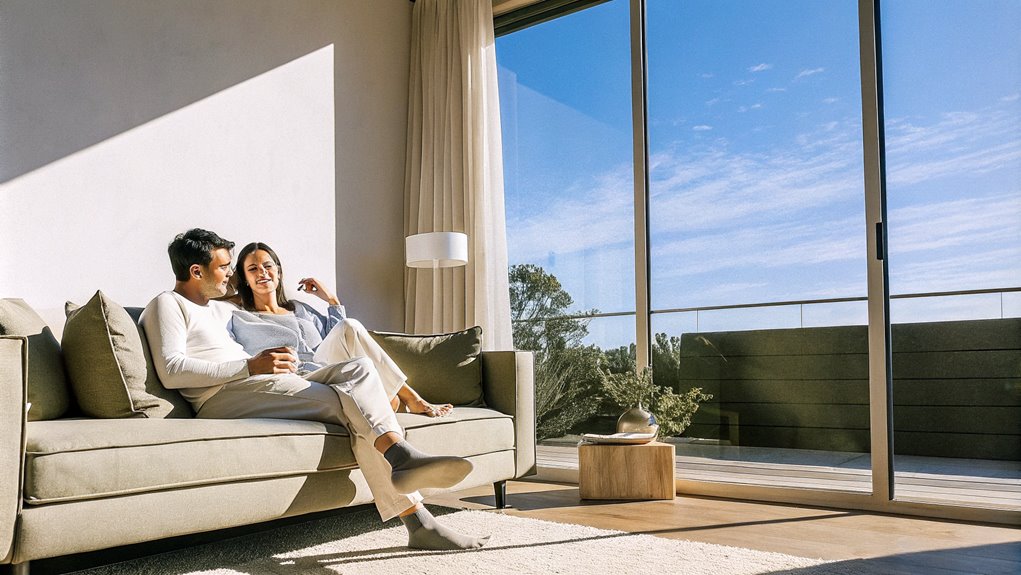
Moving to a bigger home can make your old furniture look too small. Your stuff that filled your old home may not be enough now.
Just like a small fish in a big pond, your furniture needs room to grow! You'll want to buy more chairs, tables, and beds to make your new home feel cozy.
You'll also need things like rugs, pictures, and pretty items to make each room look nice. These new items can cost a lot of money, but they help turn your big empty house into a warm home.
Higher Maintenance Costs
When you get a bigger home, you need to fill it with more stuff. Think about chairs, tables, and things to make it pretty. But that's just the start.
A bigger home needs more care to keep it nice. This means more work and money for you.
You will pay more to:
- Keep your home warm in winter and cool in summer
- Clean all the rooms and buy cleaning items
- Fix things that break or need fresh paint
- Take care of your yard and grass
- Fix big stuff like air units and pipes
All these costs add up fast. This means less money for fun things with your family.
Before you pick a big home, think about how much it will cost you each month to keep it nice.
Remember: Every extra room needs more money to take care of it – not just to buy it.
More Pieces Needed
Moving to a bigger home means you need more stuff to fill it up. Your old furniture might look too small in the big new rooms. You'll need to buy new things to make each room feel like home.
What You Might Need:
- Big rugs to cover more floor
- New curtains for bigger windows
- More chairs for guests
- Bigger TV stands
- More places to store things
- Reading chairs for bedrooms
- Tables and cabinets to serve food
- Places to put books and games
Getting all these new items costs a lot of money. Good furniture that fits in big rooms isn't cheap. Many people want to fill up empty rooms right away. But buying everything at once can hurt your wallet. It's okay to take your time filling your new spaces.
| Room | What You Might Need |
|---|---|
| Living Room | More seats, bigger TV stand |
| Bedroom | More closets, reading spots |
| Dining Room | Food storage, serving table |
| Family Room | TV setup, book shelves |
Empty Space Problems
Empty rooms can feel lonely when you don't have furniture yet. Your big home needs items in each room to feel like a real home.
But buying new things costs a lot of money. What starts as a few empty rooms can make you worry about money later.
Here's what costs a lot:
- Big comfy couches and beds cost more than a thousand dollars each
- Window covers for many windows add up fast
- Big rugs for big rooms cost more than small rugs
- You need pictures for the walls
- You need places to put your stuff, like closets and shelves
Think about this: each empty room means you'll need to spend money to fill it up. This can make it hard to save money for other things your family needs.
Time Lost in Transit
We know how hard it's when you live far from work. All those minutes in the car add up fast. You miss out on happy times with your kids.
Just think – if you spend 30 minutes more to get to work and 30 minutes back, that's one whole hour you could have used to eat dinner with your family, help with homework, or read stories.
Being stuck in traffic for so long makes you tired. When you finally get home, you mightn't have much energy left. Your kids could be in bed when you walk in the door.
In the morning, everyone has to rush to get ready. Sure, you might've a bigger house far away, but you lose the chance to make memories with your family.
Reduced Social Interactions
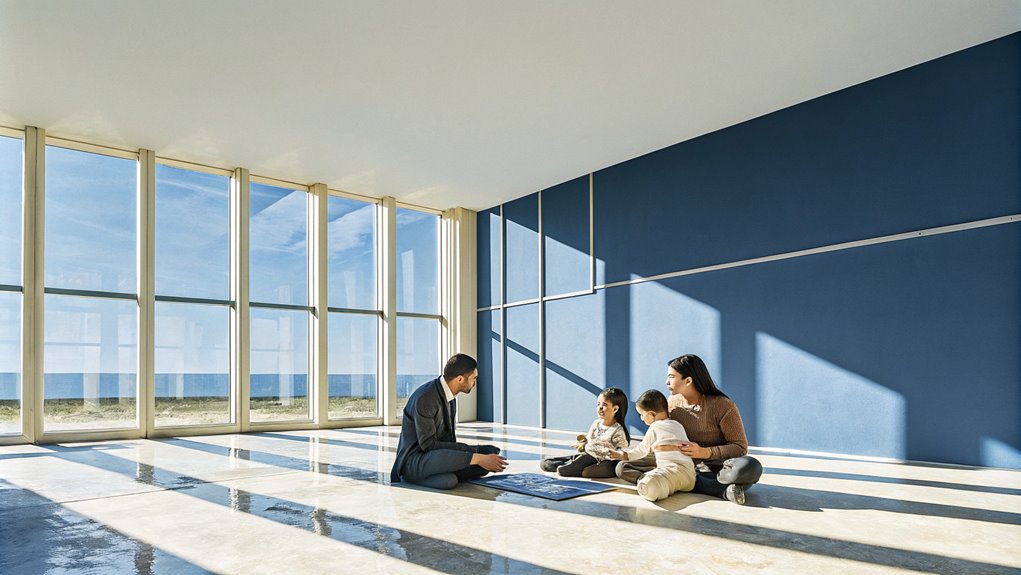
Moving far from the city can make it harder to see your friends and feel close to others. When you move to a big house far away, you may feel lonely at times.
You can't just walk down the street to meet a friend for coffee anymore. Your kids might find it hard to play with their school friends after class. When you want to have people over, they've to drive a long way to see you.
It's also harder to join fun things happening in town. In big yards far apart, you don't bump into neighbors as much as you used to.
Think about how much you like seeing friends and family before you move far away. A bigger house might mean fewer hugs and chats with people you care about.
Heating and Cooling Inefficiencies
When you live in a big house, keeping it warm or cool can cost lots of money. Your air and heat have to work extra hard to make all the rooms feel nice.
Some spots in your home might stay too hot or too cold, no matter what you do. This means you waste money on rooms you don't even use much.
You end up having to pick: spend more money to stay comfy, or save money but feel less comfy in your home.
Rising Energy Costs
Living in a bigger home can make your energy bills go up a lot. When you heat or cool more space, you use more power. This means you'll pay more money each month.
Your AC and heater have to work extra hard in a big house. If your home has many floors, some rooms may feel too hot while others feel too cold.
Big rooms with tall walls need lots of air to stay nice and warm or cool.
Big windows look pretty but they can be a problem. In winter, they let warm air escape. In summer, they let too much heat come in.
Even rooms you don't use need some heat or cool air to stay dry and safe.
Remember: the bigger your home is, the more money you'll spend on energy bills.
Dead Zones Waste Money
Your home should feel cozy in every room. But some spots may feel too hot or too cold. We call these "dead zones."
Dead zones pop up in rooms far from your main heating and cooling unit. You might find them over the garage or in new rooms added to your house. When this happens, your heating system has to work extra hard.
Most families stop using these rooms because they feel bad. But you still pay to heat and cool them! Some people buy small heaters or window air units to fix this. This costs even more money.
Think about it – when you can't use part of your home, you waste both space and money. You could use that money for things your family wants and needs.
Harder to Downsize Later
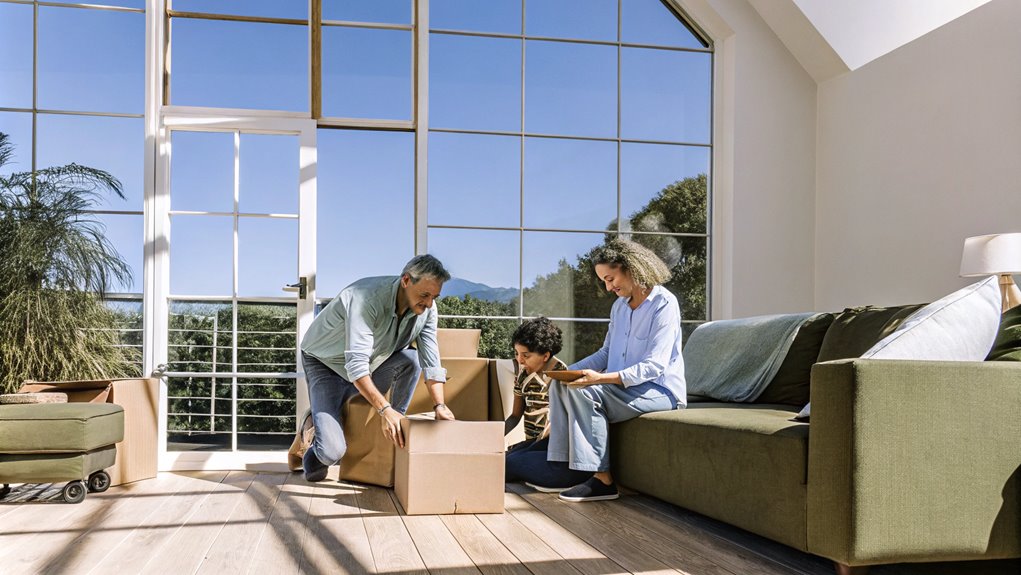
Moving to a Small Home Later is Hard
When you live in a big home, moving to a small one can be tough. Your rooms are full of things you love and memories you made over many years.
Think about:
- Big couches and tables may not fit in tiny rooms
- Going through old boxes takes time and can make you sad
- Not many people want to buy big homes
- Keeping rooms you don't use costs lots of money
- Moving from a big home costs more than moving from a small one
Before you pick a big home, think about what you want years from now. It might be smart to stay small so you won't have these problems later.
Financial Strain and Stress
Living in a big home can make your wallet and mind feel heavy. Each month, you'll need to pay more for your house loan, taxes, and safety plans. When you turn on the heat or air, your bills grow bigger with all that space to warm up or cool down.
Taking care of a big house costs more money too. You might need to fix a big roof or clean lots of windows. The yard needs more work. You may buy extra chairs and pretty things just to fill up empty rooms.
When things break, it costs more to fix them because there are more things that can go wrong.
When you spend so much on your house, it can make you worry. If a big bill comes up that you didn't plan for, or if you make less money than before, you might've to pick between paying for your house or other things your family needs.
Less Outdoor Living Space
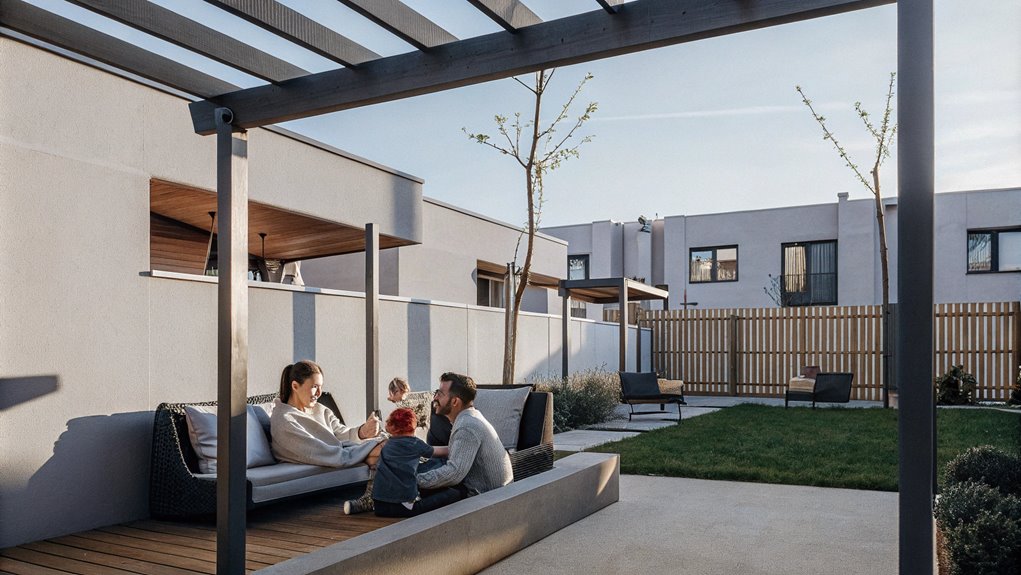
Your cozy outdoor space is important for your family's happiness. When you build a bigger house, you'll have less room outside to play and be together.
Think about what this means:
- Kids need space to run and play
- You might miss growing flowers and veggies
- Family BBQs and parties need room
- A bigger house can block the sun
- You'll have less space to exercise
Look at how your family uses the yard now.
Your backyard is like another room where you can make happy memories together. Before you build bigger, think about what matters most to your family.

